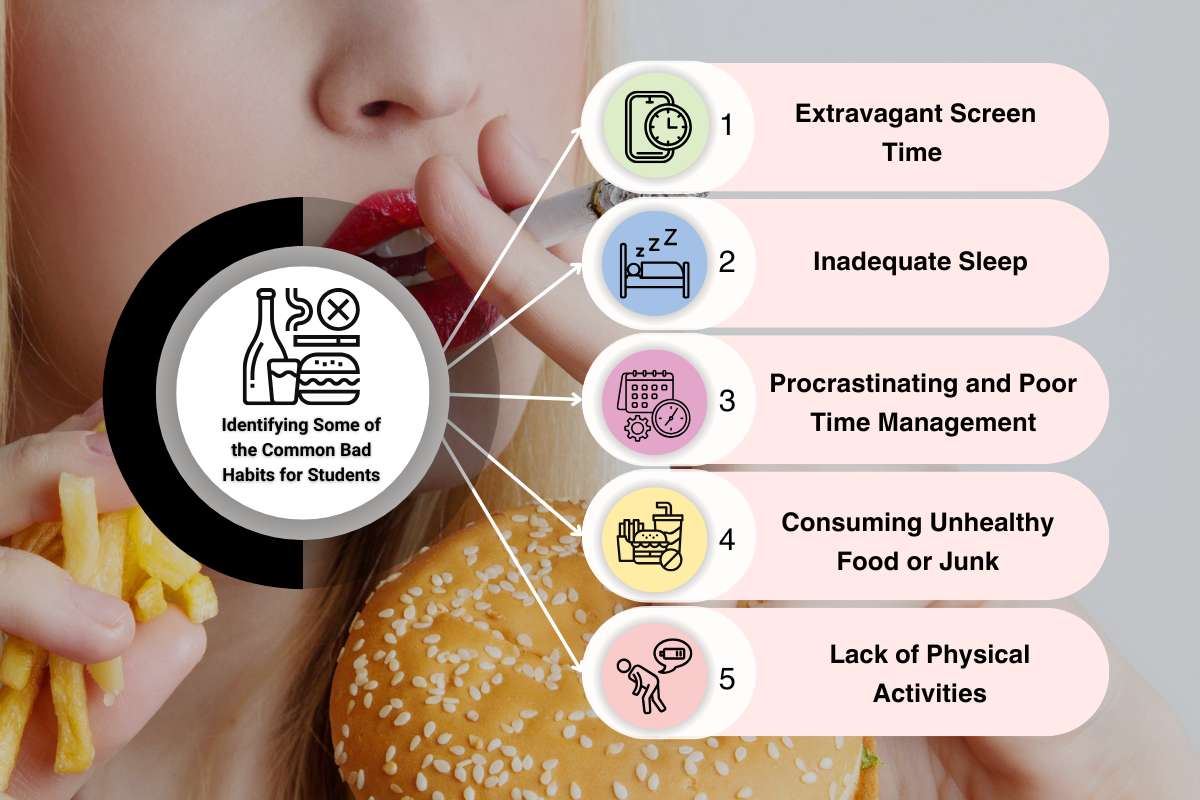Education is a journey, in which students often encounter lots of challenges and face so many ups and downs that can significantly hamper their academics and overall well-being. Among these challenges, developing bad habits is the most common among students. Bad habits impact the productivity, and learning, of a child, and they also negatively affect mental and emotional health which is very essential to maintain the energy and motivation to achieve goals.
Recognizing and addressing these negative habits and improving them early on is crucial for students or it can create a solid foundation for their whole life and it directly impacts their goals. Ultimately, by identifying and overcoming these negative behaviors students can improve their focus, reduce stress, and enhance their learning outcomes, paving the way for long-term success in both education and life.
Here, in this article, we will explore the most common bad habits for students which they naturally develop over time, see their consequences, and try to provide strategies to overcome these challenges.
Identifying Some of the Common Bad Habits for Students

1. Extravagant Screen Time
In the modern age, digitalization is increasing at a massive speed, and students use their electronic gadgets for entertainment purposes, socializing, and studying as well, which leads to excessive screen time. Excessive screen time impacts the eyes of the students, decreases concentration power, disrupts sleeping patterns,s and more. The students need to maintain a healthy balance and try to indulge in other physical activities, rather than using gadgets.
2. Inadequate Sleep
Bad habits are correlated with each other, develop one, and the other comes naturally with them. For example, excessive screen time at night leads to inadequate sleep patterns. In a world, where digitalization is at its peak, getting a proper sleep of 7-8 hours is a dream for many. There can be many reasons, such as late-night studies or partying with friends and family, insomnia or other sleep disorders, and indulging in social media activities. Prioritizing proper sleeping hours is the most crucial for the body, mind, and soul, or it can lead to mental and physical illness due to increased stress hormonal levels.
3. Procrastinating and Poor Time Management
If students use excessive gadgets, they will be exposed to excessive screen time, which leads to inadequate sleep. To complete their required sleep hours, students often have to delay or procrastinate their work. Intentionally or unintentionally, the act of delaying or postponing tasks is known as procrastination. This behavior gradually increases, often leading to poor time management, and students end up rushing to complete important assignments or tasks. This habit of delaying or neglecting work can severely affect a child’s academic performance; they are unable to meet deadlines, resulting in poor grades, unnecessary stress buildup, and anxiety.
Managing time smartly is the most crucial part of a student’s life. Students need to manage their time by prioritizing tasks and creating structured to-do lists on a daily, weekly, and monthly basis. By managing their time wisely, students can overcome procrastination and have enough time for studying, engaging in extracurricular activities, and taking rest, which ultimately boosts their academic performance and overall well-being.
4. Consuming Unhealthy Food or Junk
The market for unhealthy food products is growing day by day. Big food giants and manufacturers are responsible for almost 90% of online and offline sales and marketing. Many students fall into the trap of unhealthy eating habits and skipping nutritious home-cooked meals. Consumption of junk food such as pizzas, burgers, packaged food, sugary soft drinks, and desserts is the key to many health problems such as obesity, and mental and physical illness, which ultimately lead to low energy levels, lack of concentration, and risk of heart health. It is very important to choose healthy and nutritious meals over junk food.
5. Lack of Physical Activities
As we already know how much physical movement of a body is crucial for anyone. It helps to maintain overall well-being whether it is a healthy mind or a healthy body. But students neglect giving time to fitness or physical activities. There can be any reason pressure of academics, lots of classes, investing more time in social media, or just a lack of motivation. Your body is the ultimate wealth you have, so it is important to invest in it otherwise you have to face massive loss.
Realization of the Consequences of Bad Habits for Students
The bad habits we have already discussed are the main reasons for the decline in academic performance. When students spend excessive time on gadgets, they often neglect proper sleep, leading to various health problems. These health issues directly impact their academic performance, as students may postpone tasks and studies due to illness. Consequently, this results in a decline in grades and overall learning outcomes. The consequences of bad habits for students are not only limited to academics, they impact majorly the physical and mental health of a student.
It doesn’t end there; some individuals are aware that they are engaged in bad habits, which they perceive as guilt or pressure of maintaining poor habits, leading to increased stress and anxiety. Bad habits can also affect your social life. Relationships with your family and friends also hampers for example students who are isolated due to prioritizing social media over real people can lead to a lack of support from friends and family.
How to Break the Chain of These Bad Habits for Students?
1. Set Realistic Goals

Setting realistic and achievable goals is the first step to approach any challenge. Fragmenting larger tasks into smaller ones helps to manage them easily and it creates a sense of accomplishment which leads to motivation.
2. Establishing a Routine
Consistency is important for building good habits. Having a daily routine can help students create an organized environment that boosts productivity. By setting specific times for studying, eating, exercising, and relaxing, students can achieve a balanced lifestyle that reduces distractions and improves focus.
3. Seeking Support
Using available resources like school counselors, study groups, or academic workshops can be very helpful for students trying to break bad habits. Connecting with classmates and professionals can provide fresh ideas, support, and motivation, making it easier for students to make positive changes in their lives.
4. Mindfulness and Self-Reflection

Practicing mindfulness and self-reflection can help students become more aware of their habits and behaviors. Techniques like journaling, meditation, or simply taking time to think about their daily actions can boost self-awareness and help them understand how certain habits impact their lives. By reflecting on their choices, students can spot areas where they can improve and make intentional efforts to change.
Conclusion
In conclusion, Bad habits for students need to be addressed, if they want to improve their academic performance and overall well-being. Understanding the negative effects of these habits—like falling grades and emotional stress—shows why it’s essential to take steps to improve. By setting realistic goals, creating routines, seeking help, and practicing mindfulness, students can break free from negative habits and create a more successful and satisfying academic experience. Improvement is possible, and even small steps can lead to big positive changes in life.
Also Read: Guiding Students for Self-Directed Learning through Note-Taking Skill

